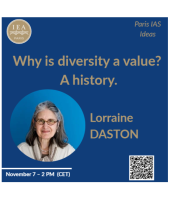Why is diversity a value? A history.
New session of the "Paris IAS Ideas" online talk series, with the participation of Lorraine Daston, Director Emeritus of the Max Planck Institute for the History of Science in Berlin, Visiting Professor at the Committee on Social Thought at the University of Chicago, Research Fellow in writing residency at the Paris IAS for the month of November 2025.
The "Paris IAS Ideas" online talk series features short and stimulating presentations from fellows of the Paris Institute for Advanced Study, marking the beginning of 1-month writing residencies.
Online only and in English. Open to the public. Free event but registration required.
Register via the form at the bottom of the page to receive the connection link.
Presentation
Long celebrated for its richness and variety in nature, art and economics, diversity has now become a major moral and political value. Pliny admired the variety of flowers and precious stones, Renaissance cabinets of curiosities displayed the richness of the world, and biodiversity and the division of labour revealed its efficiency. Yet never before has diversity had such ethical and political significance. Universality, on the other hand, now arouses suspicion: does it reflect the interests of all or only those of a privileged group? How did this transformation happen so quickly, and why is diversity so fascinating today?

|
|
|
|
|
|
